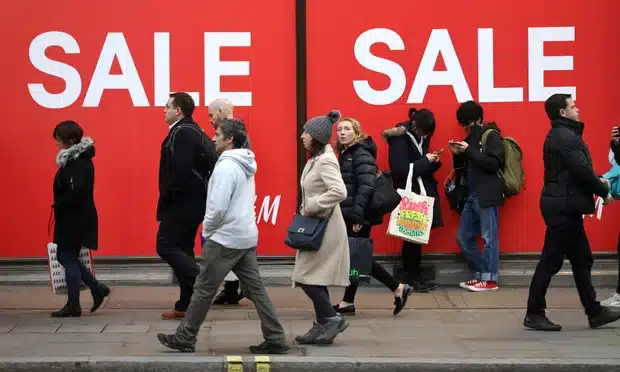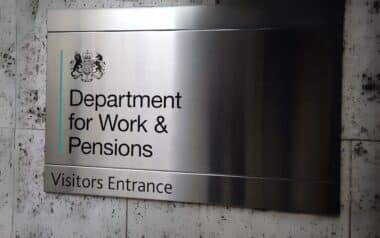Britain’s largest retailers are bracing for a challenging year, with warnings that they may be compelled to cut thousands of jobs due to rising taxes and escalating employment costs following a disappointing Christmas shopping season.
High Street Retailers Struggle as Consumer Spending Shifts
Recent data from the British Retail Consortium (BRC) highlights the precarious trading conditions facing high street retailers. Sales growth during the crucial “golden quarter” from October to December was nearly stagnant, with total UK retail sales increasing by a mere 0.4% year-on-year. As consumers prioritised spending on food and drink during the festive season, overall retail sales volume fell when adjusted for inflation.
For 2024, total sales are projected to increase by 0.7% compared to 2023, reflecting a cautious consumer approach as households continue to manage the repercussions of the most significant inflationary shock in decades.
Separate analysis from Barclays reveals that consumer card spending stagnated in December, as families opted to cut back on essentials and dining out, favouring experiences instead.
Retailers Face Unprecedented Challenges Amid Rising Costs and Economic Uncertainty
Helen Dickinson, chief executive of the BRC, indicated that retailers are preparing for a year fraught with difficulty, contending with an additional £7 billion in costs stemming from proposed tax hikes and new government regulations. This situation is compounded by several factors:
- Increased Employment Costs: Expected £25 billion rise in employer national insurance contributions.
- Minimum Wage Hikes: A planned 6.7% increase in the national minimum wage.
- Economic Slowdown: Growth projected to have flatlined in the latter half of 2024.
The situation places further pressure on Keir Starmer’s government, as signs of a deepening economic slowdown emerge. Business leaders have expressed concern that these measures will force companies to either reduce their workforce or pass increased employment costs onto consumers through higher prices.
Rising Food Prices and Urgent Calls for Government Action
Clive Black, a retail analyst, has revised his forecast for food inflation for 2025, doubling it from 1.5% to 3%. He asserted that “UK government policy is now the primary driver of grocery price appreciation.”
Retail giants such as Tesco, Marks & Spencer, and Next have communicated their concerns to Rachel Reeves, warning that the anticipated £7 billion increase in annual costs following the budget could result in job losses and inflated prices.
Dickinson emphasised the need for government intervention to alleviate the burden on struggling retailers, cautioning that failure to do so could lead to widespread job losses.
“With little hope of offsetting these costs through increased sales, retailers are likely to raise prices and curtail investment in both stores and jobs, jeopardising our high streets and the communities reliant upon them,” she stated.
Chancellor Defends Budget Amid Ongoing Economic Challenges
In response to criticism of her budget, the Chancellor defended the necessity of tax increases to repair underfunded public services and maintain sustainable government finances.
Consumer spending has been under significant pressure since inflation peaked at 11.1% in October 2022. This spike was triggered by the aftermath of pandemic lockdowns and geopolitical tensions, compelling the Bank of England to raise interest rates to their highest level in 15 years.
Although inflation has since subsided to more manageable levels, it is projected to remain above the Bank’s 2% target until 2027, constraining the potential for interest rate reductions. Households are beginning to recover financially after experiencing wage growth that outpaced inflation, yet a cautious spending approach persists.
Online Sales Surge Amid Struggles for High Street Retailers
Additional figures from audit firm BDO reveal that retail sales in discretionary spending categories rose by 2% year-on-year during the golden quarter, a marked improvement from a 1.6% decline in the same period in 2023.
However, BDO cautioned that this increase was largely driven by online sales, with high street stores struggling to achieve a sales growth of just 0.1% in the final quarter of the year.
The firm noted that adverse weather conditions and flooding in parts of the UK may have pushed consumers towards online shopping, where sales surged by 20.7%.
Nevertheless, BDO warned that the ongoing difficulties faced by high street retailers could be exacerbated by rising employment costs and tax increases.
Sophie Michael, head of retail and wholesale at BDO, remarked,
“Businesses have yet to fully experience the impact of heightened wage costs introduced in the budget, which disproportionately affect consumer-facing sectors. Recent reports indicate that 170,000 shop workers lost their jobs in 2024, with expectations that this figure will continue to rise in 2025.”









